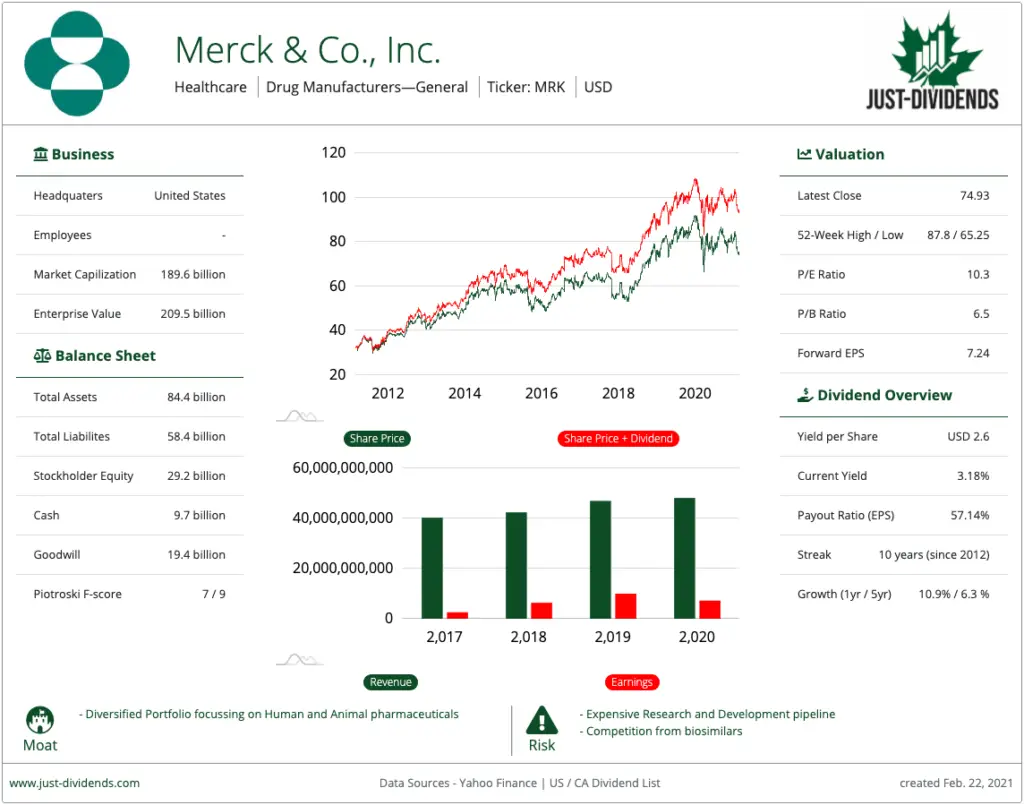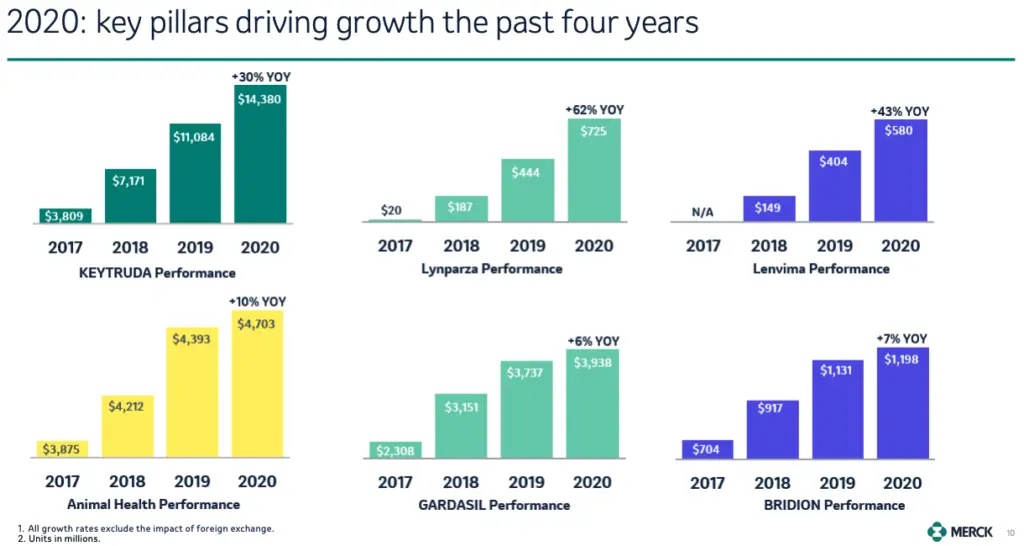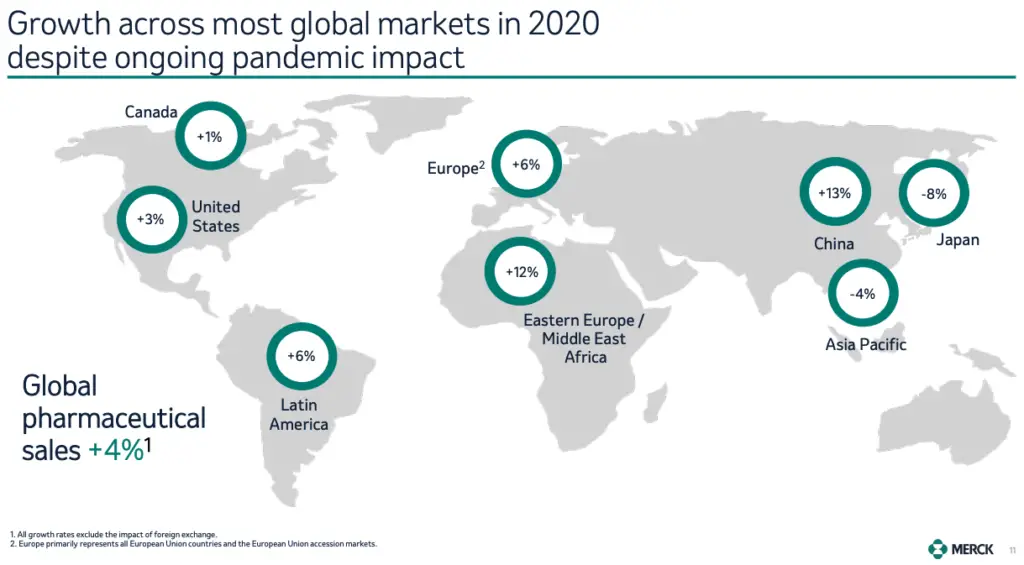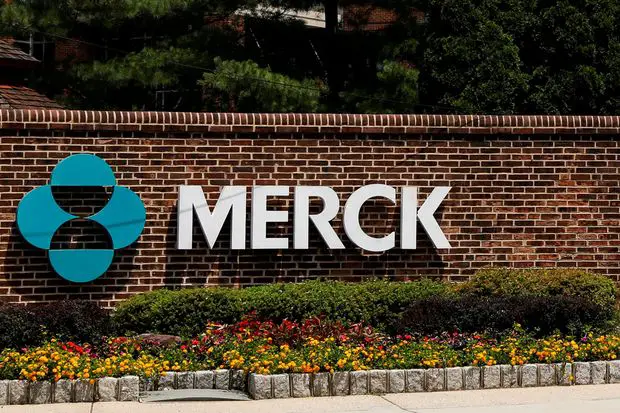Hello fellow Dividend-investors, as a guest on valueofstocks.com I would like to introduce myself. I am Christoph, a 30-year old German expat living in the great white north - Canada.
Ever since starting my investment journey in 2016, I’ve been fascinated with the strategy of Dividend Growth Investing. I have been using cash flow generated from dividends to build my portfolio and achieve my desired asset allocation. My ultimate goal is to build a stream of income substantial enough to eventually support my family without the 9-5 grind.
Today I would like to introduce you to one of the companies I’ve analyzed recently to evaluate whether it’s worth a spot in my dividend growth portfolio.
Initial Screening
Merck & Co. Inc, or Merck Sharp & Dohme (outside of the US and Canada) is the 5th largest pharmaceutical company in the world. Founded in 1891 the company can look back on a rich history of vaccines for humans and animals including the first mumps vaccine, as a great milestone.
Merck’s peer group consists of other global leaders in pharma such as Johnson & Johnson (NYSE: JNJ), Pfizer (NYSE: PFE) on a national level, and Novartis AG (NYSE: NVS, Switzerland) and GlaxoSmithKline plc (NYSE: GSK, Great Britain) when looking across borders. All of those names may sound familiar when looking at dividend growth stocks in the healthcare sector.
A note of caution - Merck & Co Inc shares the name with the German biotech company Merck KGaA as it was originally established as a subsidiary in 1891, but was nationalized by the US during the first world war before being privatized again in 1919. Outside of the US and Canada the German company holds the rights to the brand name Merck, while Merck & Co is recognized as Merck Sharp & Dohme. 
Merck Business Model
Merck offers products in two major business segments: Pharmaceutical (including human health), and Animal Health.
The Pharmaceutical segment is largely driven by the humanized antibody used in cancer immunotherapy under the brand name Keytruda. The drug seems to be poised for leadership in the immuno-oncology market. As it can be used to treat several prevalent cancers such as lung cancer and melanoma.
On the Animal Health side, the company offers a wide range of products. For livestock of the global food industry (eg. swine and poultry) and pets such as flea medication. And also a wide range of vaccinations for dogs and cats.
The key drivers for growth in their respective business segments are outlined below.
 The company was able to boost its global pharmaceutical sales around the globe by 4% despite the pandemic weighing on the industry in 2020.
The company was able to boost its global pharmaceutical sales around the globe by 4% despite the pandemic weighing on the industry in 2020.
 Both graphics can be found in Merck’s Q4 2020 Earnings presentation.
Both graphics can be found in Merck’s Q4 2020 Earnings presentation.
Merck Dividend Growth and Sustainability
Merck’s current dividend yield as of 02/22/2021 is 3.47%. Right in the middle of other players in that space, and above their 5-year average yield of 2.95%.
The following section will cover some history on and judge the sustainability of Merck’s dividend. By examining the payout ratio as well as its growth to determine whether the conglomerate makes a compelling case for dividend growth investors.
Dividend History & Growth
Merck introduced a quarterly dividend with payouts in March, June, September, and December in 1970. Since then, Merck has slowly but steadily raised the dividends. With a prolonged period without dividend growth in the first decade of the 2000s. Ever since raising the dividend again with the payout in December 2011. Shareholders can look back on a 10-year dividend growth streak. Awarding the company the status of a US Dividend Challenger (Companies with Dividend Growth streaks between 5 and 10 years).
Reflecting on the years since 2011, the dividend per share has increased by over 71.05%, with the latest dividend increase announced on November 17, 2020. Over the same period, the price per share has roughly doubled. Leading to a slightly lower starting yield than in 2011, but capital appreciation is a welcoming sign for potential shareholders.
From a dividend growth investor’s point of view, you will have to ask yourself whether that dividend growth is enough for your portfolio. There are options in the pharmaceutical space that offer higher dividend growth rates.
Payout Ratio
Over the past 10 years, Merck’s dividend payout ratio has hovered between 48% and 181%, with a 5-year-average of 124%.
From a payout ratio standpoint alone, this would raise a red flag for me. As my personal target is between 30% - 60%. Depending on the sector to leave enough room for potential future dividend growth.
Merck Financial Snapshot
Using the Piotroski F-Score to get a first glance at Merck's current financial health, we see it secures a 7 in the 0-9 ranking which signals a healthy financial position.
Over the last 5 years, the earnings and revenue results of Merck have been relatively flat. The debt-to-equity ratios have been steadily increasing, raising another red flag when analyzing their historical performance.
On the positive side, compared to its peers Merck offers a higher return on equity and higher operating margins.
That being said, Merck’s debt is still well covered by its operating cash flows. The interest payments are covered considering a 19.8x coverage rate by EBIT.
Investment Case
In the following section, we will dive into the company's Moat. As well as bull and bear cases to outline which headwind the company might face while providing insight into their strategy and growth opportunities.
Moat
Pharmaceuticals tend to base their economic moat mostly on intellectual property (an intangible asset). Patent protection allows the company to reap the rewards of research and development for years to come until patents expire and their current portfolio can be challenged by biosimilars.
The Bull Case
Keytruda is a relatively new drug that can generate and drive sales growth for the foreseeable future. Basic patents for that drug won’t expire until 2026 when its position can first be challenged by biosimilars.
Additionally, the company completed 120 business development transactions in 2020 including a number of bolt-on acquisitions (acquisition of smaller companies in the same line of business) to unlock strategic opportunities and growth.
With both factors in mind, Merck offers a current portfolio for short-term growth as well as opportunities to expand their business further in their already developed lines of business.
The Bear Case
One of the strongest headwinds for any company in that space is the mix of competition from biosimilars (a biologic drug that is highly similar to a drug that was already authorized for sale) paired with the expensive Research & Development costs for new drugs and trials, which underlie further regulatory barriers before entering any market.
Moreover, after abandoning the race for a COVID vaccine Merck missed a huge opportunity for sales and revenue growth.
Conclusion
As of now, I would not add Merck to my portfolio. While the company has a diversified portfolio, I am waiting to see meaningful growth over the next couple of years. With the high payout ratios and increasing debt to equity levels, I don’t have enough trust in their long-term strategy of rewarding shareholders with aggressive dividend growth. As shown over the past three years.
Nevertheless, Merck retains a spot on my watchlist as it only needs one big success of their R&D pipeline to turn around my doubts on their ability to produce significant growth which supports their commitment to shareholders.
As always, I recommend potential investors browse through the documents found on Merck’s investor relations page as a great start for their due diligence.
Thank you for making it through my stock analysis of Merck & Co., Inc. Do you hold a position in Merck or other Drug Manufacturers? I invite you to share any feedback and experiences with the company or its peers!
I’d like to give a special thanks to Value Of Stocks for the opportunity and for facilitating this cooperation and I’m very much looking forward to future guest-posting opportunities.
Disclaimer
I do not hold a position in Merck & Co., Inc. (NYSE: MRK) but the stock will remain on my watchlist.
This article expresses personal opinions and observations of someone who is not licensed to provide financial advice.
I am not receiving compensation for writing this analysis. I have no business relationship with any company whose stock is mentioned in this article other than the long positions I own. Furthermore, I cannot guarantee the accuracy of the financial metrics gathered from 3rd party services like Morningstar and Yahoo Finance.

